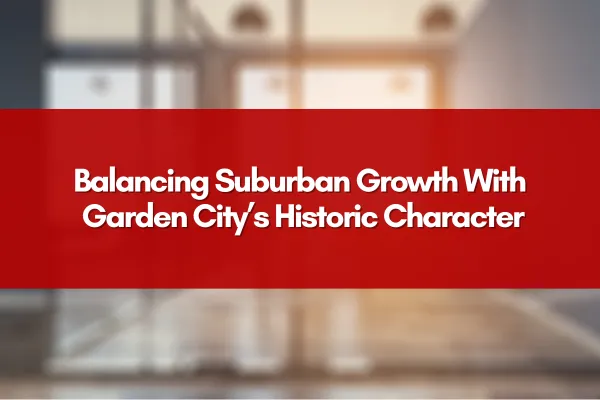How Much Is Your Home Worth?

Balancing Suburban Growth With Garden City’s Historic Character
Balancing Suburban Growth With Garden City’s Historic Character
Living in Garden City NY is a delightful blend of history and modernity. As a local residential community, it boasts a rich heritage that continues to attract those seeking charm and convenience. But with a surge in development and population, how does this gem preserve its historic character while embracing growth?
Understanding how to achieve this real estate development balance is crucial for residents, developers, and city planners alike. This article dives into the importance of maintaining Garden City’s unique identity amidst rapid suburban expansion.
The History Behind Garden City’s Unique Charm
Garden City was one of America’s first planned communities. Designed in the early 20th century, it was envisioned as a suburban utopia combining the best of city and country living. The historic plans emphasized green spaces, self-sustaining neighborhoods, and architectural preservation.
These principles still influence many modern development policies. Preserving the essence of Garden City ensures that new projects do not erode its historic fabric.
The Challenge of Modern Development
In recent years, Garden City’s real estate market has experienced growth. The median home price last month was around 1.6 million dollars, reflecting high demand. The appeal remains strong due to its proximity to NYC, top-tier amenities, and its scenic suburban environment.
However, this growth raises concerns. Developers must carefully balance real estate development — supporting local economy and infrastructure while respecting the neighborhood’s historic roots.
How To Achieve a True Real Estate Development Balance
Having a sound preservation strategy is key. Here are tangible ways Garden City can foster growth without compromising its heritage:
Implementing Strict Zoning Laws
Local zoning should encourage adaptive reuse of historic buildings. For instance, converting old estate homes into boutique shops or community centers can preserve architectural integrity.Promoting Green and Sustainable Design
New developments should prioritize eco-friendly construction. The garden city movement historically emphasized greenbelts; modern projects can incorporate green roofs, trails, and preserved open spaces.Encouraging Community-Engaged Planning
Residents' voices shape responsible development. Hosting community forums allows local input, ensuring projects align with the community's values.Preserving Architectural Character
Development guidelines should specify building styles aligned with historic architecture. This approach prevents visual inconsistencies and maintains the neighborhood’s aesthetic.Protecting Green Spaces
Greenbelts and parks are the heart of Garden City. Efforts should be made to protect these areas from encroaching development, maintaining the suburban ambiance that residents cherish.
Local Market Insights and Data
The Garden City market continues to thrive, with prices up approximately 6.7% over the past year. Homes tend to sell at 101.3% of their list price, indicating a seller’s market. The average home value stands at roughly 1.28 million dollars, reflecting high demand but also the importance of responsible growth planning.
The local market's strength calls for development strategies that sustain property values while safeguarding the historic essence. Sustainable development can boost the economy and improve infrastructure—if done with care.
Conclusion: A Path Forward
Garden City’s future hinges on achieving a sustainable balance between growth and preservation. This involves thoughtful planning, community involvement, and adherence to the principles that made it a model suburb in the first place.
When development respects the traditional charm and environmental needs of the area, Garden City can continue to be a desirable place to live for generations.
Looking to buy or sell in Garden City? Partner with Guy Etienne, a dedicated real estate agent committed to preserving the community’s character while supporting responsible growth. Call 347-228-8145 or email [email protected] to start or discuss your next move.





